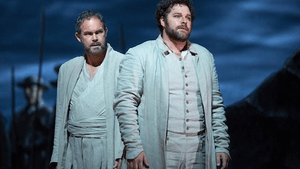Stay in the Loop
BSR publishes on a weekly schedule, with an email newsletter every Wednesday and Thursday morning. There’s no paywall, and subscribing is always free.
Revisiting 'Tell's' tale
Metropolitan Opera presents Rossini's 'Guillaume Tell'

Everyone knows the overture to Rossini’s Guillaume Tell (William Tell), thanks to the Lone Ranger. Few people, however, have seen the opera. That galloping melody, by the way, does not appear in the opera itself.
It is a neglected masterpiece, not performed at the Metropolitan Opera since 1931, and it was never sung there in the original French. There’s no record of any staging in Philadelphia.
Contender for the high C's
The new production at the Met is musically impressive, mostly for the tenor singing of Bryan Hymel, a 2008 graduate of the Academy of Vocal Arts (AVA). Two other AVA alums are in the cast — Ross Benoliel and Michele Angelini — and so is Curtis Institute graduate bass-baritone John Relyea, making this nearly a Philadelphia event.
While the title role is for a baritone (in this case, Gerald Finley) that character has no stand-alone aria. The tenor character of Arnold, a Swiss patriot, is much more prominent. Hymel electrified the house with the opera’s big number, “Asile héréditaire,” in which he laments his father’s death, and its follow-up fast-tempo cabaletta, where he swears vengeance. He heroically dominated the action in two romantic duets with soprano Marina Rebeka, who played Mathilde, the sister of the commander of the occupying Austrians.
Hymel’s dominance brought to mind a young Luciano Pavarotti, who became known as “King of the High Cs” when he belted nine of those notes in Donizetti’s The Daughter of the Regiment.
In this William Tell, Hymel sang 22 high Cs and two C-sharps. Even more importantly, he accomplished authentic French placement and resonance. More than anyone else in the excellent cast, he created a glowing sound that seemed to radiate from behind his cheeks and nasal passages in the French style, rather than from “the mask” between the eyes, as with Italian singing, or from the throat or chest in German and Russian.
This surely is attributable to Hymel’s coaching during four years at AVA, and possibly abetted by his upbringing in Louisiana.
In the French style
That’s significant because Rossini moved to Paris in 1824, five years before he wrote William Tell, and immersed himself in French culture. With this composition he made an intentional shift from bubbly Italian romantic comedies to a new style of French-language drama that influenced Meyerbeer and Halevy in the following decades.
The story concerns the Swiss longing for liberation from the cruel Austrian occupation led by villainous governor Gesler (Relyea). Action is static during the opera’s nearly five hours, but choral music repeatedly extols sunsets, pastures, and high Alpine peaks.
Fabio Luisi led the orchestra in a refined, lyrical performance, while Donald Palumbo’s chorus sang magnificently.
George Tsypin’s sets and Pierre Audi’s staging are allegorical rather than realistic, with white fluorescent light tubes that represent trees. Blinding white skies alternate with darkness in an apparent effort to stress the struggle for freedom over tyranny. While the production is visually boring, it is nonetheless musically revelatory.
What, When, Where
Guillaume Tell (William Tell). By Gioachino Rossini. Fabio Luisi conducted. Pierre Audi directed. Through November 12, 2016 at the Metropolitan Opera, Lincoln Center, 10 Lincoln Center Plaza, New York, New York. The Met Live in HD will broadcast Guillaume Tell on March 18, 2017. (212) 362-6000 or metopera.org.
Sign up for our newsletter
All of the week's new articles, all in one place. Sign up for the free weekly BSR newsletters, and don't miss a conversation.

 Steve Cohen
Steve Cohen